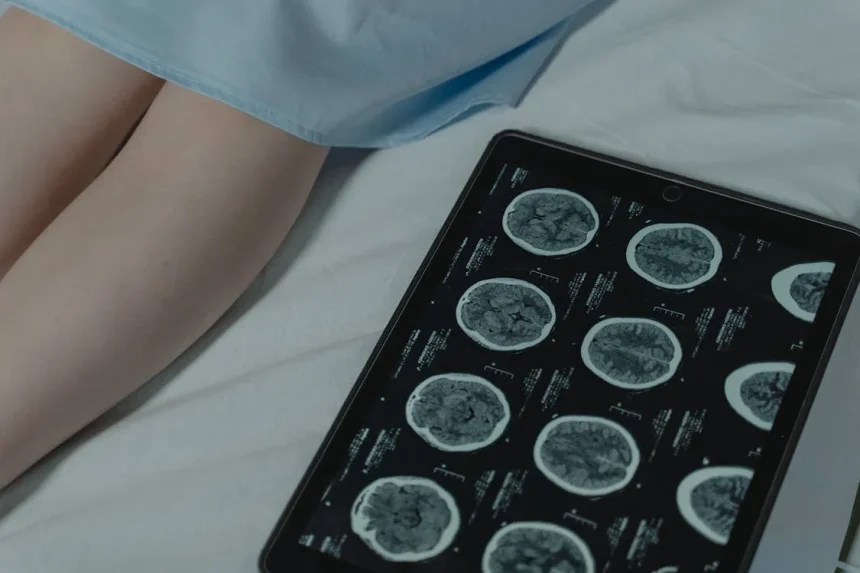Artificial intelligence (AI) in healthcare can help better diagnose, design, and predict health risks. One of its use cases is predicting different health conditions, like brain tumors, using AI, which works with complex datasets. Let’s look at how AI technologies have developed, their potential, and their limitations.
How AI Predicts Health Risks
AI technologies, particularly machine learning (ML) and deep learning algorithms work on massive volumes of data and find patterns or correlations beyond human perception. Many of these algorithms in healthcare deal with medical imaging, genetic information, electronic health records (EHRs), and other data sources for predicting health risks.
When dealing with brain tumors, AI systems perform virtual scanning of MRI and CT scans of a patient with significant precision. Convolutional Neural Networks, a deep learning model, have high pattern recognition capability in medical images. AI has been shown to detect potential tumors and classify their type and stage, giving cues to treatment planning.
AI is also being used to see long-term effects caused by medications. For example, studies are looking into depo provera brain tumor to examine any links created between these forms of medication and other health issues.
Developments in AI Applications
Some of the developments include:
Medical Imaging
AI has remarkably enhanced the reading of medical images. Applications such as Qure.ai and Aidoc assist radiologists in identifying anomalies in imaging scans, thereby increasing the accuracy of diagnosis while expediently considering the best treatment option.
Moreover, emerging systems are being trained to identify minute markers for diseases that may escape the human eye, bringing diagnosis to a much earlier stage.
Predictive Analytics
By infusing AI with EHR, health providers can assess the likelihood of brain tumors appearing based on history, lifestyle, and predisposition, among other factors. Platforms of predictive analytics are being designed to generate alerts for high-risk patients for prevention screening and personalized intervention.
Genomic Analysis
Owing to the growing developments in AI being used for genomics, many genetic markers associated with brain tumors have been identified through this approach. This has helped in the early detection and tracking required for intervention. AI tools like IBM Watson and Google DeepVariant are helping researchers uncover previously unknown genetic links to diseases.
Wearable Tech and Biomarkers
AI is being outfitted into wearable devices that monitor health parameters such as heart rate, oxygen concentration, and other neurological signals. Easily giving an ideal diagnosis of the earliest signs of issues with brain tumors or other medical problems, these systems help a lot in active monitoring and gleaning predictive analyses about a patient’s health.
Limitations and Challenges
While AI technologies are transforming the health sector, there are some limitations:
Data Quality and Bias
AI algorithms rely on the quality and diversity of the data from which these technologies learn. Failing to provide accurate datasets transmits some level of harm to the majority. Efforts are in high gear to diversify training datasets to address these disparities.
Interpretability
Many AI models, particularly deep learning algorithms, are often termed black boxes, making it only difficult for clinicians to understand how they generate predictions. Such opacity may stall trust and uptake.
Regulatory Issues
AI tools undergo strict regulatory standards for safety and efficacy. Certification or approval could take ages and is cost-prohibitive, delaying their deployment. Agencies such as the FDA are developing frameworks to accelerate the evaluation of AI-based medical technologies.
Ethical Considerations
Deploying patient data into AI systems raises issues of privacy and consent. There must be frameworks for governing data to address those concerns upon research development. Furthermore, some ethical dilemmas surrounding the misuse of predictive health data need pertinent contemplation.
The Future of Artificial Intelligence in Healthcare
Explainable AI (XAI) investigation developments are creating more transparent and interpretable algorithms. This fosters greater trust between clinicians and patients. Moreover, as the datasets become more comprehensive and representative, the accuracy and fairness of AI predictions should improve.
The possibility of real-time risk assessment using it for cases of brain tumors is thus integrated with wearable health-monitoring devices and biomarkers that can support early interventions and improve patient outcomes.
Furthermore, the ongoing research and development of AI models that can analyze multimodal data combining images, genetic information, and clinical information will provide a more integrated view of patient health.
Partnerships formed among technology corporations, research institutions, and healthcare delivery providers will foster rapid developments in AI solutions. Public-private partnerships and global data-sharing initiatives will likely play a pivotal role in advancing AI’s potential in healthcare.
Endnote
AI is promising for predicting health risks like brain tumors due to its ability to use data for diagnostics and preventative healthcare transformations.
However, unlocking some of the most important benefits will require addressing data quality, interpretability, and ethics limitations. The expansion of AI has increased the potential to predict and manage health risks by providing earlier diagnosis, personalized care, and better outcomes.





